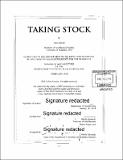Taking stock
Author(s)
Karsan, Zain
DownloadFull printable version (15.96Mb)
Other Contributors
Massachusetts Institute of Technology. Department of Architecture.
Advisor
Sheila Kennedy.
Terms of use
Metadata
Show full item recordAbstract
This thesis is sited in a near and uncertain future in the Rust Belt of America. The title of this thesis refers to three interrelated conditions, industrial technology, material culture and architectural agency. 'Taking' refers to the act of taking control and reclaiming agency. 'Stock' under describes the vast potential of industrial sites as materially, technologically, and architecturally fertile ground. An expanded notion of stock prompts the emergence of new figures in the city of industrial abandonment and decline. This is the story of the material monks, who, garbed in the protective cloaks of their foundry, take back their material agency to mine cities of rust, combing through the dross around them. They come from a world of quotidian obsolescence, but they bring with them a new assessment of stock. Their resistance materializes in a set of machine hacks, and by taking stock of the tools of their foundry and the materials that surround them, the monks construct their monastery. With each hack they devise, the monks transform a kind of building waste into a kind of building material. But they are troubled, by the scale of the undertaking, and the impossibility of completely taking stock, for nothing can escape the scrutiny of their attention or the scope of their salvages. They must accept that their work will never finish, and like Sisyphus, must hack and re-hack, endlessly recycling material and technology. They can never escape the furnace that will melt down their machine parts, or the hopper that takes and redistributes their crushed and dismantled assemblies.
Description
Thesis: M. Arch., Massachusetts Institute of Technology, Department of Architecture, 2018. Cataloged from PDF version of thesis. Includes bibliographical references (page 157).
Date issued
2018Department
Massachusetts Institute of Technology. Department of ArchitecturePublisher
Massachusetts Institute of Technology
Keywords
Architecture.